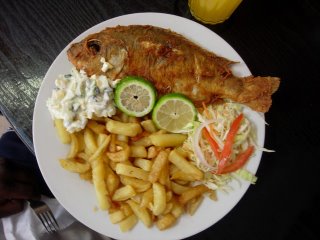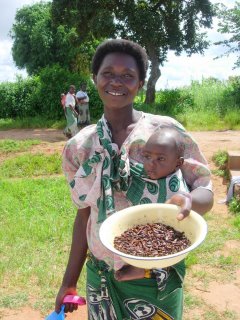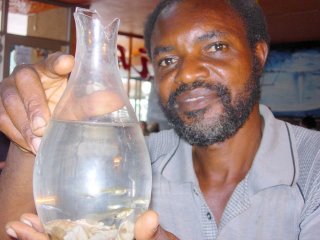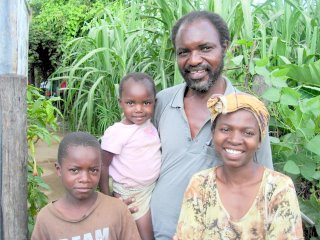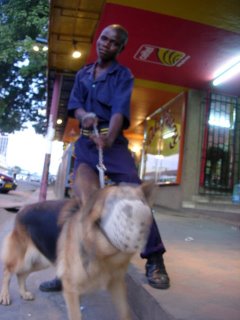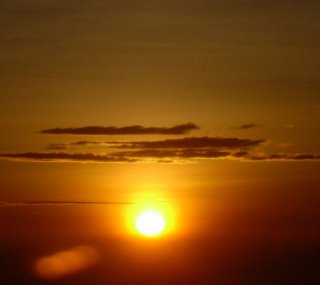 First of all, I don't need to tell you that I'm not a great artist. In fact, I'd make a better jockey or belly dancer or something.
First of all, I don't need to tell you that I'm not a great artist. In fact, I'd make a better jockey or belly dancer or something.But this is my diagram and you'll have to make do.
A bit of a lecture in astronomy here:
If you drew a line through the axis of the earth and continued it forever above the North Pole, the line would just about exactly touch the star Polaris. We also know it as the North Star because it's directly north of the Earth.
If you were to watch it all night long, it wouldn't move. All the other starts, however, would be moving in a circle around it going in a clockwise direction. The cool thing about the North Star is that it doesn't move. That makes it a pretty convenient way to always know where north is. Just find the North Star (by the way, the two stars on the far side of the Big Dipper --on the opposite side of the handle -- will always point to the North Star) and you'll be looking north. Also, if you measured how high the North Star is in the sky -- compared to the horizon and straight up -- you'd know your latitude. If the horizon is zero degrees and straight up is 90 degrees, the position of the North Star along way is your latitude. If you're on the equator, the North Star would stay on the horizon. If you were shivvering on the North Pole, it would be above you. That's how mariners can tell where they are in the Northern Hemisphere.
Problem is that the Southern Hemisphere doesn't have a "South Star" and that really sucks. The next best thing they have down here is the constellation Crux or, as many people call it, The Southern Cross. It's a kite-shaped constellation that isn't in the spot where the South Star would be if it existed, but it point in that direction -- toward where the South Star should be. Remember, the Southern Cross -- like all of the other stars in the southern sky, rotate around that spot in the sky where the South Star isn't.
So to find where the South star isn't, you measure the distance between the two stars in the kite-shaped Southern Cross that are farthest apart. Then you follow the tail of the kite four and one half times it's length and you'll be at this blank spot where the South Star should be.
In the diagram -- I know, it's really bad -- you'll see the Southern Cross off to the left just as it rises above the horizon (in February). It changes as the earth travels around the Sun and messes up the night sky. Anyway, at this time of year, the Southern Cross would be on the horizon just after sunset and would point to the right. Six hours later, however, the cross will have rotated with the night sky and be above the Celestial South Pole (that's more of an official name) and be pointing down. Six hours later, just before sunrise, it would be off to the right and pointing to the left. Just imagine it rotating clockwise across the sky. The whole trip across the sky takes 12 hours. The next 12 hours, it's still rotating in the same direction, but you can't see it because it's daytime and the sky blocks it.
When I was walking my dog at night in the dark in Vietnam in 1968 and 1969, I discovered that I could tell time by keeping track of the Southern Cross. Wherever it was when I started my six-hour shift, it would be exactly 90 degrees to the right (or clockwise) when the six hour shift was over.
I came to love the Southern Cross and, for about 38 years, I've longed to see it again. When I was in Nigeria last year, the skies were never clear enough. When I was in Nicaragua, it was the same situation. And when I was in Hawaii, it was the wrong time of year. Oh, I forgot to mention that because the Southern Cross is not exacly on the Celelstial South Pole, it's sometimes possible to see it from the lower latitudes of the Northern Hemisphere. That's how I saw it in Vietnam. But if you're in the continental U.S., you ain't never gonna see the Southern Cross.
My wonderful friend Debbie Winger (not the actress -- but more talented) was the winner. She'll win a cheap trinket of some kind from Malawi. Two other people got it, but not as quickly as Debbie.
Thanks for all the good guesses.




